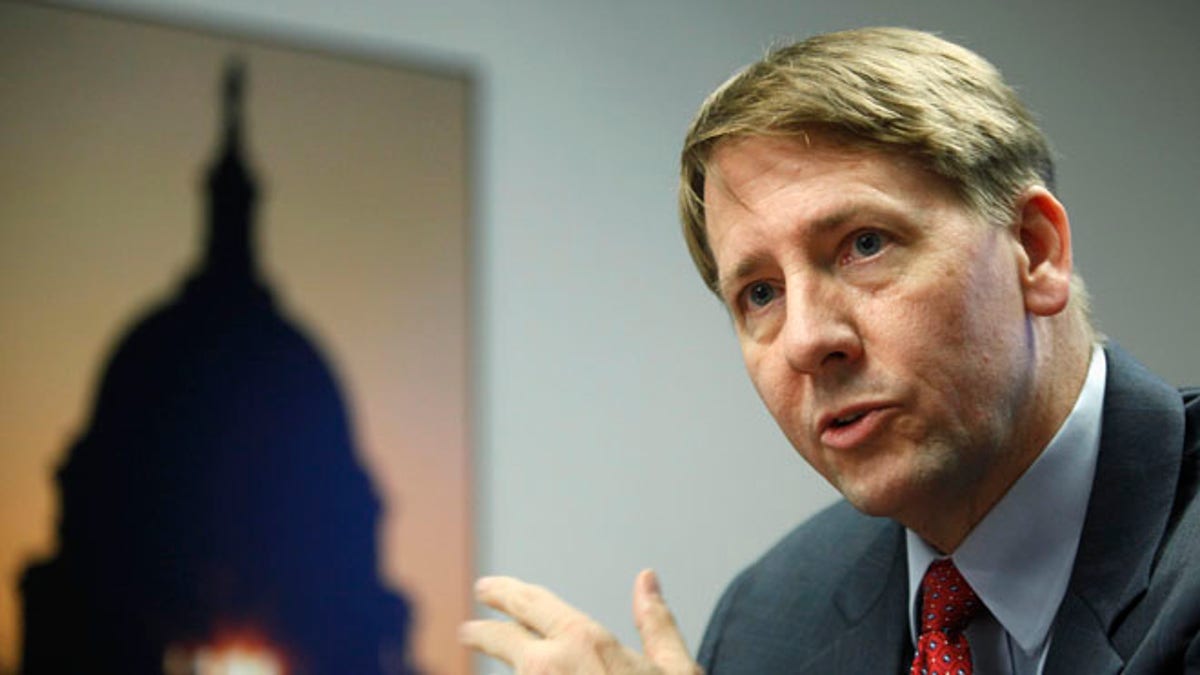
Oct. 23, 2013: Consumer Financial Protection Bureau (CFPB) Director Richard Cordray answers questions at the Reuters Washington Summit in Washington. (Reuters)
WASHINGTON – America's new consumer watchdog agency has come up with a unique solution for its troubled employee-rating system: Give almost everyone a gold star.
The independent Consumer Financial Protection Bureau -- created under the 2010 "Dodd-Frank" financial industry overhaul to serve as a consumer watchdog -- says it's scrapping its system of employee ratings in response to concerns that it was discriminatory.
That rating system assigned workers a score of between one and five. Due to concerns with the system, everyone who scored a three or above, regardless of performance, will now be getting the top rating of five -- along with the corresponding retroactive pay raises that the top rating brings.
Those raises will likely cost more than $5 million, according to the American Banker, which first reported on the ratings troubles in a March 6 article.
Going forward, the bureau is looking at using a new two-tiered rating system for at least two years while officials evaluate the old system.
But the retroactive payments raise the possibility that workers who slacked off could be rewarded the same as top performers.
“To give an across-the-board raise slaps the face of the people who deserve it,” said Linda Swindling, author of “Stop Complainers and Energy Drainers: How to Negotiate Work Drama to Get More Done,"
The changes come after American Banker found that minority employees were likely to receive lower evaluations than their white counterparts. A 2013 internal agency report found 74.6 percent of white employees received ratings of four or five compared with 65.2 percent of Hispanics and 57.6 of black employees.
In a May 19 email sent to staff members and made available to FoxNews.com, CFPB Director Richard Cordray said the agency conducted a thorough audit of how employees were given raises.
He said “broad-based disparities” in the way employees were rated in 2012 and 2013 had been uncovered in several areas including: race/ethnicity, age, bargaining unit membership eligibility, location in the field or at headquarters, and tenure as a CFPB employee.
“These differences indicate a systemic disadvantage to various categories of employees that persisted across divisions, offices and other employee characteristics,” Cordray wrote.
The changes are being billed as a way to correct the wrongs of 2012 and 2013. Every rank-and-file CFPB worker who received a three or four summary performance rating in 2012 or 2013 under the previous program will be given raises as if they had received the highest rating at the time of evaluation. Senior management is excluded from the process.
But others aren’t buying it.
Swindling recommended the agency work to let employees know that managers are working toward changing the office culture and rating system -- not pay off employees who may or may not have deserved a merit raise.
Bankstocks.com columnist Thomas Brown called it “a pathetic bow to political correctness.”
“Hard-working, conscientious workers (and, yes, the federal government does have those) deserve to be treated better and paid more than workers who, say, persistently show up late and turn in shoddy work,” Brown said.
Cordray said the agency recognizes the change does not address the underlying system itself. Describing this as a temporary change, he said the agency is committed to rooting out problems but it will take time.
The CFPB was created as a new-era regulator responsible for keeping consumers safe, rather than nursing big banks back to health. The sign outside its Washington office even looked edgier than the typical D.C. office -- with the name “cfpb” in lowercase letters on a bright green background.
The bureau was championed early on by Harvard University professor Elizabeth Warren, before she was elected to the U.S. Senate.












































